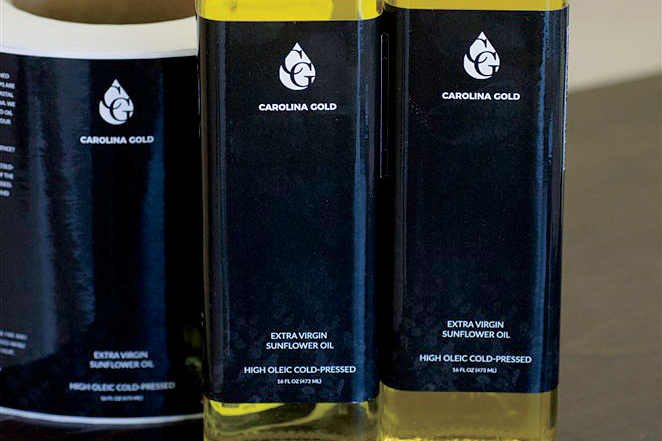Home > Farm > Farm to Table > How Sunflowers Helped One N.C. Farm Diversify
How Sunflowers Helped One N.C. Farm Diversify
In partnership with: North Carolina Department of Agriculture & Consumer Services

The farmhouse at R. Britt Farms in Harrellsville has been in the Britt family for more than 100 years.
“My great-great-grandfather bought this farm in 1910,” Lee Britt says. “Right now, I’m sitting beside a photo of him standing by his tobacco barn on this very farm more than a hundred years ago. That’s a great and humbling feeling.”
Alongside his father, Britt spends his days farming the same land his family grew up on for generations. The family farm has a rich agricultural history, having produced everything from tobacco and peanuts to corn and beans. They’ve even raised cattle and chickens.
But today, the Hartford County landscape looks a little different than it did to Britt’s great-great-grandparents.
A Sea of Sunshine
If you stepped foot on the Britt’s land today, you would quickly spot a sea of yellow sunflowers swaying gently in the North Carolina breeze, petals stretched up to the sun. While the picturesque view is certainly worthy of a postcard, the family doesn’t grow these beauties simply for the aesthetics. They grow them to produce sunflower oil.
“Sunflower oil is very light with an earthy, nutty flavor,” Britt says. “It’s great for frying and makes a good replacement for olive oil. It’s surprisingly diverse. You can do a lot with it.”
The culinary world is beginning to embrace this oil for a multitude of reasons. In addition to offering a light smoke point of 380 degrees Fahrenheit, sunflower oil is reported to lower cholesterol levels, boost heart health, improve the immune system, provide an energy boost and reduce inflammation. It’s even used in cosmetics to make soaps, lotions, massage oils and lip balms.

Diversifying the Farm
As the tobacco industry slowed down, several farmers in North Carolina were forced to make a decision: walk away from their land or grow something new.
Britt says his family faced the same dilemma.
They knew if they wanted to keep their farm, they needed to diversify and explore new options for keeping the business afloat.
“It’s funny how our sunflower oil came about,” Britt says. “I was talking to a friend of mine one day, and he made a point about how many farmers go into debt because they buy at retail and sell at wholesale. He said that just isn’t the way of the world. It doesn’t make sense.”
With that in mind, Britt came home and started thinking about what they could grow and sell directly to consumers.
“The first thing I thought about were soybeans,” he says. “I knew they produced oil, and the byproduct could be used in animal feed. From there, we thought about peanuts and then we landed on sunflowers.”
They started slow, pulling 30 acres from their pasture land to grow the first crop of sunflowers. Today, they are up to almost 500 acres. Even better, their sunflower oil, which they sell under the name Carolina Gold Oils, is in demand from local restaurants and stores.
“When I started this business, I reached out to several places and asked if they would be interested in selling or using our product,” Britt says. “Some were interested, and some weren’t.”
Just a few months later and everyone wants it.
“Now we have people calling us to ask about carrying the oil,” Britt says. “It’s a great feeling, especially since it basically started with me knocking on doors.”
Carrying on a Legacy
Although they’ve traded in one crop for another, the Britt family legacy will live on – this time with fields of sunshine.
“Agriculture either sticks with you or it doesn’t,” Britt says. “I feel fortunate that it stuck with me.”



